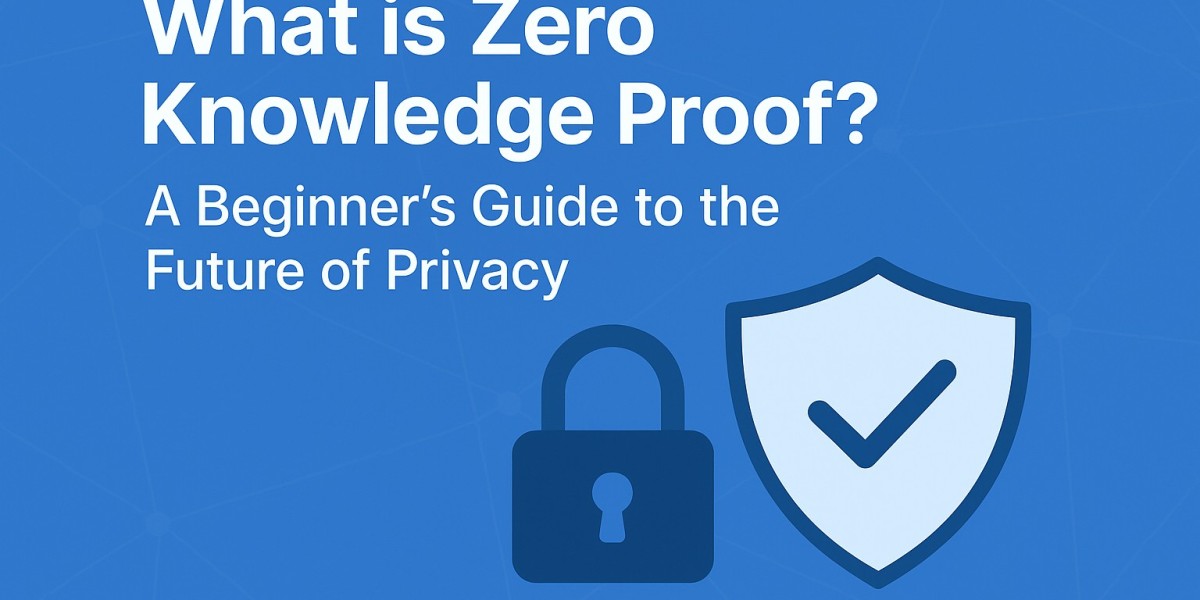In the present day of internet, when personal information is shared on a regular basis throughout the internet, privacy has become the most important concern. From money transactions to visiting sites, we are compelled every now and then to share intimate information to authenticate ourselves. But think about it: what if you could prove your identity or a piece of information without revealing the information itself? This is exactly what Zero Knowledge Proof (ZKP) does.
In this beginner’s guide, we’ll break down what Zero Knowledge Proof is, why it matters, and how it’s shaping the future of online privacy.
What is Zero Knowledge Proof?
At its core, Zero Knowledge Proof is a cryptographic method that allows one party (the “prover”) to prove to another party (the “verifier”) that a statement is true, without revealing any additional information beyond the fact that it is true.
For example, suppose you must prove that you are of age to enter a bar. In regular life, you'd take out your ID card, which displays your birth date, name, and even your address—far more information than the bar needs to know. Zero Knowledge Proof enables you to basically prove that you are over 18 (or 21, depending on where on Earth you live) without relinquishing any other personal data.
This renders ZKP a groundbreaking way of digital interactions because it minimizes data exposure while still ensuring trust.
A Simple Analogy
Zero Knowledge Proofs may be slightly abstract to start, so let's not complicate things.
Suppose there's a closed door with a hidden code. You want to demonstrate to someone that you know the code without actually giving the code away. With Zero Knowledge Proof, you can demonstrate that you can unlock the door if you need to, without ever divulging the code.
In this manner, you establish trust but keep your secret safe.
Why Zero Knowledge Proof Is Important
Privacy is a scarce commodity in the digital age. Corporations are collecting humongous amounts of data about us, typically exposing users to identity theft, hacking, or surveillance. Zero Knowledge Proof allows for control over limiting data sharing, giving users greater control over their own data.
The major benefits include:
More Privacy – Users reveal only what is required and nothing else.
Data Security – Sensitive data never touches your device, reducing exposure to breaches.
Trust Without Transparency – Systems can certify truth without having access to raw data.
Scalability – ZKPs can authenticate processes, making them faster and more efficient.
Forms of Zero Knowledge Proofs
There are two forms of ZKPs:
Interactive ZKPs – Prover and verifier exchange a back-and-forth procedure to check validity.
Non-Interactive ZKPs (NIZKPs) – The proof can be verified from a single message, without ongoing communication. These are frequently used in blockchain networks because they are efficient and trustless.
Uses in the public world
Zero Knowledge Proof is not just a theory. It's already being applied in real-world applications:
Blockchain & Cryptocurrencies – ZKPs power privacy coins like Zcash, enabling anonymous transactions in which amounts and participants are kept secret.
Authentication Systems – Instead of sending your password to a server, you can prove knowledge of it without ever sending it, reducing hacking attacks.
Finance & Banking – Customers can prove creditworthiness without sharing all financial data.
Healthcare – Patients can prove medical eligibility (e.g., being a blood donor) without sharing their entire medical history.
Voting Systems – ZKPs can be used to provide secure, anonymous, and verifiable digital elections.
Challenges and Limitations
And, as with every emerging technology, Zero Knowledge Proofs are not perfect. Some of the concerns are:
Complexity – Mathematics used in ZKPs is extremely advanced and complex to apply and comprehend.
Performance – Proof verification and proof creation can be computationally expensive, though innovations like zk-SNARKs and zk-STARKs are improving efficiency.
Adoption – Most of the globe continues to rely on traditional methods of verification, so widespread adoption will be incremental.
The Future of Privacy with ZKP
As we keep moving further into the digital realm, technologies like Zero Knowledge Proof will become increasingly important. Web3, DeFi, and the metaverse will all require new ways of preserving trust while keeping user privacy intact.
In the coming years, we can expect ZKP to:
Become a standard protocol in blockchain for enabling private transactions.
Be adopted by governments and banks for secure digital IDs.
Enhance everyday web services like email, cloud storage, and authentication protocols.
Conclusion
Zero Knowledge Proof is more than a complex cryptographic concept—zero-knowledge proofs are a revolution in how we conceptualize privacy and trust on the web. By facilitating proof without disclosure, ZKPs offer us a path to an internet in which security and privacy march together.
With more widespread adoption, ZKPs can ideally form the basis for a safer, more private web. For anyone who is interested in personal data privacy in the internet world, knowing Zero Knowledge Proof is the first step toward adjusting to the future of privacy.






